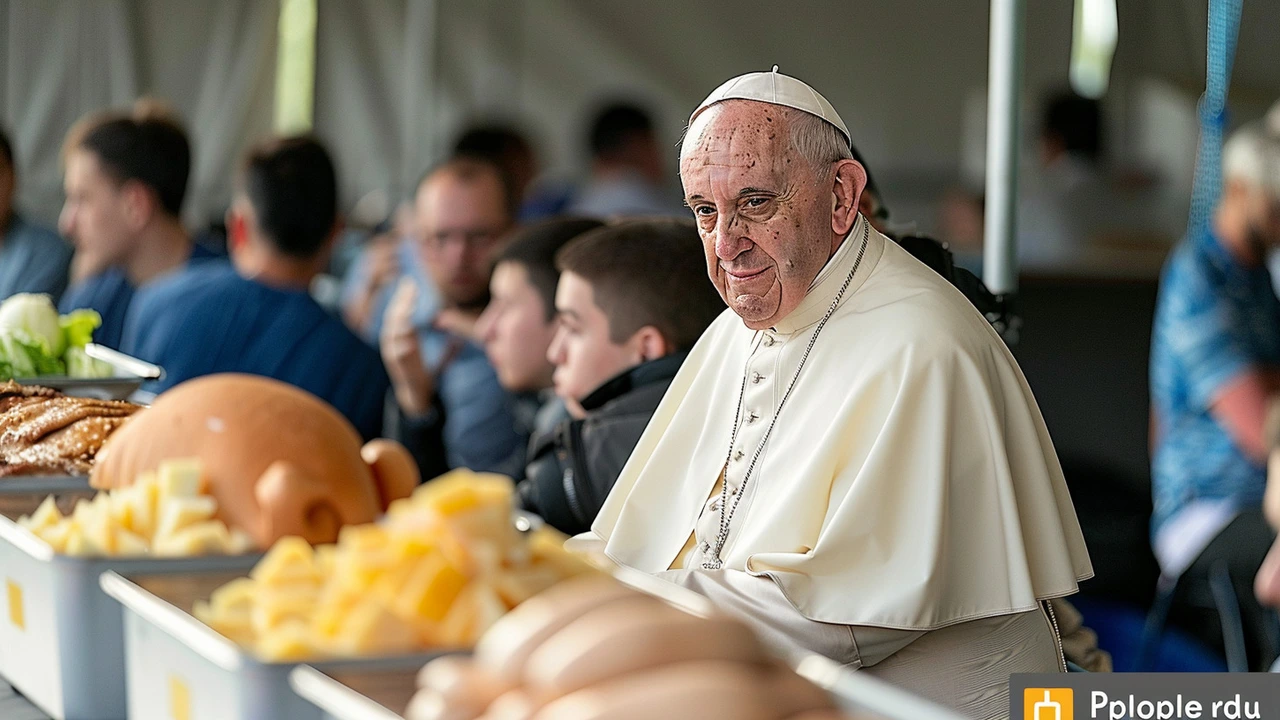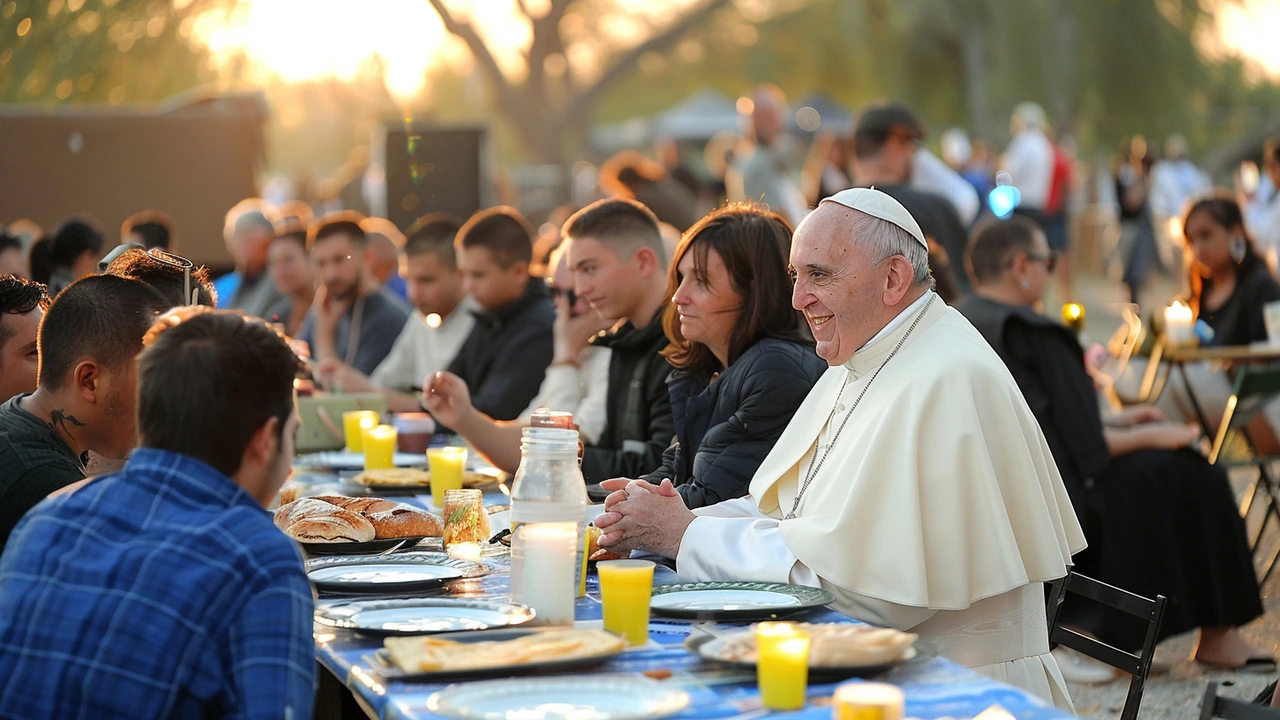Pope Francis Highlights Divine Favor for the Poor on World Day of the Poor
Pope Francis has once again turned the Church’s focus to the marginalized and the impoverished on the occasion of the eighth World Day of the Poor. This day, which is observed every year on the third Sunday of November, has become an integral part of the Church’s calendar. The theme for the 2024 celebration is 'The prayer of the poor rises up to God,' words that echo deeply through the Pope’s message. He insists that Christian hope fundamentally involves the certainty that the prayers of the poor are heard by God.
In his address, Pope Francis encourages the faithful to engage more wholeheartedly with the lives and stories of the poor they encounter daily. He emphasizes that understanding these stories requires more than just a superficial glance; one must genuinely connect with the hardships faced by those less fortunate. By doing so, prayer transforms into a powerful act of communion with the suffering, a bridge that fosters true empathy and understanding.
The Pope’s message draws inspiration from the Book of Sirach, an often overlooked yet profoundly enriching text. Ben Sira, the author of Sirach, presents themes that resonate with the Pope’s call to action, with a particular focus on the significance of prayer and the honored position of the poor in God’s eyes. Pope Francis believes that the wisdom contained in Sirach deserves more attention within the Church and beyond, especially for its thematic depth and relevance.
Pope Francis does not shy away from critiquing contemporary attitudes towards success and happiness. He points out a disturbing trend where personal success is often pursued at the expense of others' rights and dignity. This mentality, according to the Pope, is not only flawed but fundamentally opposed to Christian values. True joy and fulfillment, he argues, come from upholding the dignity of every individual, particularly the most vulnerable among us.
The Pope’s message is both a reflection and a call to action. He underscores that the Lord’s judgment will undoubtedly favor the poor. This divine preference, as he explains, springs from an inherent recognition of their suffering and their hope. It is from this place of poverty that authentic hope can emerge, offering a beacon of light in even the darkest times.
Expressing his gratitude for the World Day of the Poor, Pope Francis sees this observance as more than just a day of reflection. He calls it a crucial pastoral opportunity, a chance for the Church to implement real and lasting initiatives that provide tangible support to the poor. These initiatives, he insists, must go beyond superficial charity; they must be rooted in genuine, prayerful compassion.
For Pope Francis, prayer is inseparable from action. He emphasizes that there can be no real charity without prayer. Prayer, he insists, must not be an empty ritual but a force that translates into concrete, positive change in the world. It is in this fusion of prayer and action that the true spirit of Christian charity can be realized.
As the global community prepares to observe the World Day of the Poor, Pope Francis’s message serves as a powerful reminder of the Church’s mission. It is a call to see beyond societal norms of success and to embrace a deeper, more communal understanding of happiness and fulfillment. By recognizing and acting upon the prayers of the poor, the faithful can foster a world where compassion and charity are not just ideals, but lived realities.

Understanding the Core Message
The Pope’s emphasis on the prayers of the poor reaching the heavens is not just a poetic expression; it is a theological assertion that calls for deeper contemplation. In a world where the voices of the poor are often drowned out by the cacophony of wealth and power, the Pope's message asserts their inherent worth and the divine attention they receive.
This message comes at a time when global inequities have been exacerbated by various crises, from economic downturns to pandemics. Pope Francis’s words encourage the faithful to see beyond the surface and to understand the structural and systemic forces that perpetuate poverty. In doing so, they are not merely performing acts of charity but engaging in a profound form of solidarity.
The Role of the Book of Sirach
Pope Francis’s reference to the Book of Sirach is particularly telling. This book, also known as Ecclesiasticus, is one of the Deuterocanonical books of the Bible and is revered for its wisdom literature. Sirach offers insights into the nature of piety, the importance of wisdom, and the ethical and moral duties of individuals within a community.
By encouraging the Church to revisit Sirach, Pope Francis is pointing towards a source of rich theological and ethical teaching that can inform contemporary practice. Ben Sira’s emphasis on the privileged place of the poor in God’s heart is a theme that resonates deeply with the Pope’s vision of a Church that is in touch with the realities of the modern world.
It is through this lens that Pope Francis’s call to consider the 'faces and stories' of the poor takes on additional significance. It is a call to move beyond theoretical understanding and to engage with the lived realities of poverty. This engagement, rooted in prayer and action, is what the Pope envisions as the path forward for the Church.

A Call to Action
The Pope’s message is not just reflective; it is also very much a call to action. He urges the faithful to translate their prayers into tangible benefits for the poor. This can take many forms, from providing direct assistance to advocating for systemic change. The key, however, is that these actions are infused with genuine compassion and are seen as expressions of one’s faith.
One of the critical aspects of this call to action is the emphasis on dignity. The Pope’s critique of the modern pursuit of success at the expense of others is a stark reminder of the ethical implications of our daily choices. By prioritizing the dignity of the poor and their inherent worth, the faithful can challenge societal norms that devalue human life and exacerbate inequality.
Pope Francis’s gratitude for the World Day of the Poor is multifaceted. It is an expression of appreciation for the opportunity it provides to enact real change. He sees this day as a vital part of the Church’s pastoral work, a moment to visibly demonstrate its commitment to the poor. This, to him, is a cornerstone of the Church’s mission in the world.
The Pope’s insistence on the interplay between prayer and action is a call to holistic discipleship. He sees these two elements as inseparable, with each enriching the other. Prayer without action can become hollow, just as action without prayer can lose its spiritual grounding. Together, they form a powerful testament to the true essence of Christian charity.
Implementing the Vision
To implement the vision outlined by Pope Francis, the Church must engage in various initiatives that address both immediate needs and long-term solutions. This could involve setting up food banks, shelter programs, and counseling services that provide direct assistance to those in dire need. However, it also involves advocating for policy changes that address the root causes of poverty, such as inadequate healthcare, education, and social safety nets.
Moreover, the Pope’s emphasis on prayer indicates that these efforts should be spiritually grounded. This means fostering a prayer life that is attuned to the struggles of the poor, using prayer as a means to cultivate empathy and a deeper understanding of their plight. This spiritual dimension can inspire and sustain the faithful in their efforts, ensuring that their work is not just a duty, but a calling.
The global observance of the World Day of the Poor presents a unique opportunity for the Church to embody its mission. It is a call to every member of the faithful to reflect on their relationship with the poor and to consider how they can contribute to a more just and compassionate world. Pope Francis’s message is a powerful reminder that in the face of adversity and inequality, it is the prayers of the poor that rise up to God, calling the Church to action through love and charity.

Conclusion
Pope Francis's message on the World Day of the Poor is a profound reflection on the intersection of faith, prayer, and action. He challenges the faithful to see the poor not as objects of charity, but as individuals with dignity and divine favor. His emphasis on the Book of Sirach deepens this call, illustrating a rich theological tradition that champions the cause of the marginalized. As the world grapples with ongoing challenges and inequalities, the Pope's words serve as a timely reminder of the power of hope rooted in compassion and justice. By looking to the prayers of the poor and responding with earnest commitment, the Church can live out its mission in a world in desperate need of solidarity and love.






Subhash Choudhary
June 13, 2024 AT 19:02Just read through the Pope's address – it's a solid reminder that we often overlook the everyday struggles of folks right around us.
Ethan Smith
June 20, 2024 AT 23:15The emphasis on genuine compassion over superficial charity resonates deeply; it's a call for the faithful to engage thoughtfully rather than merely perform rituals.
Evelyn Monroig
June 28, 2024 AT 03:28What the Pope fails to mention is the hidden agenda behind these “World Days.”
We’re seeing a coordinated effort to push a narrative that distracts from the real power structures.
Every time a religious leader talks about the poor, it’s a subtle way to pacify dissent.
Listen, there’s a deliberate attempt to keep the masses focused on charity rather than systemic change.
The elites fund these campaigns to appear benevolent while ignoring tax policies that favor them.
They cherry‑pick verses from Sirach to give moral cover to their own interests.
Don’t be fooled by the glossy press releases – it’s all smoke and mirrors.
The Pope’s speeches are filtered through Vatican diplomats who have their own political motives.
Remember the historical ties between the church and feudal lords; history repeats itself.
The suggestion that prayer alone can transform poverty is a manipulation of hope.
It’s a classic tactic: give people a feeling of agency while the real levers of power stay untouched.
Behind every charitable act, there’s a profit motive, whether through tax breaks or public relations gains.
Look at the massive donations that flow to large NGOs that are often complicit in the status quo.
Those NGOs rarely challenge the root causes, only the symptoms.
In short, the Pope’s nice words are a veneer over a deeper strategy to maintain the existing hierarchy.
Gerald Hornsby
July 5, 2024 AT 07:42Wow, that was a powerful reminder – love the way you tied prayer to action! 😊
Hina Tiwari
July 12, 2024 AT 11:55The Pope's words hit home.
WILL WILLIAMS
July 19, 2024 AT 16:08Exactly! Let’s turn those prayers into real‑world help – food banks, shelter, advocacy. We’ve got the energy, let’s use it!
Barry Hall
July 26, 2024 AT 20:22👍 Prayer without action is just empty talk.
abi rama
August 3, 2024 AT 00:35I appreciate the balanced tone here; it’s a good reminder that compassion needs both heart and mind.
Megan Riley
August 10, 2024 AT 04:48Such a beautiful call for solidarity! Let’s keep the momentum going and actually make a difference – every little bit counts!!!
Lester Focke
August 17, 2024 AT 09:02While the rhetoric is commendable, one must consider the theological implications of elevating the poor as a primary conduit of divine favor; it challenges traditional hierarchical paradigms.
Naveen Kumar Lokanatha
August 24, 2024 AT 13:15Indeed, the theological nuance is fascinating – the Pope’s reference to Sirach offers a rich tapestry for deeper study, especially regarding the virtues of humility and communal responsibility.
Alastair Moreton
August 31, 2024 AT 17:28Honestly, these feel‑good messages are just soft‑selling the church’s relevance. Nice words, same old story.
Surya Shrestha
September 7, 2024 AT 21:42One must also critique the systemic inertia that hampers substantive change; eloquent speech alone cannot dismantle entrenched socioeconomic structures.
Rahul kumar
September 15, 2024 AT 01:55Practical steps matter – partnering with local NGOs, lobbying for policy reform, and ensuring sustainable funding are essential beyond the pulpit.
mary oconnell
September 22, 2024 AT 06:08Oh great, another sermon about “the poor” while the world’s elite keep hoarding wealth – classic.
Michael Laffitte
September 29, 2024 AT 10:22Let’s channel that fire into community projects – art workshops, youth mentorship, and real‑world skill training for those in need.
sahil jain
October 6, 2024 AT 14:35Agreed, action speaks louder than prayer; let’s get on the ground and make tangible impact.
Bruce Moncrieff
October 13, 2024 AT 18:48Wrapping it up: let’s keep the conversation alive, support local initiatives, and remember that every small act of kindness adds up to real change.